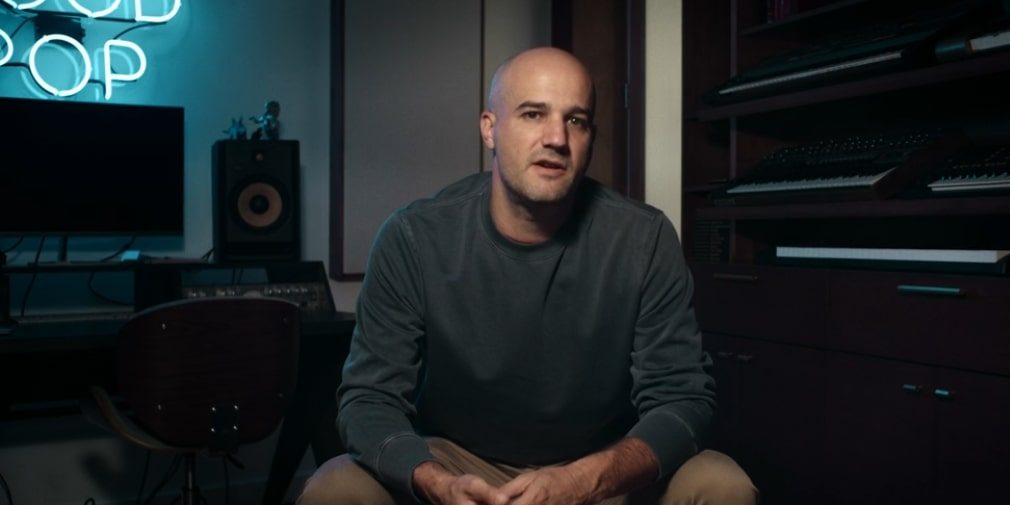Paramount+’s ‘How Music Got Free’ provides valuable insights into the rise of the mp3 industry and the escalating concerns about piracy during that time. The documentary features interviews with key players, including recording studio executives, young kids proficient in early broadband internet, and individuals leaking music for profit. Stephen Witt, an investigative journalist who wrote a critically acclaimed book on the subject, offers a third-person perspective. He presents a macro view of the events, delivering his analysis with nuance and detailed insight. It is important to have people like him, who have closely followed the events, share their opinions too as they are pragmatic and show all sides of the story with equal honesty.
Stephen Witt Explained The Music Piracy Phenomenon Clearly
Stephen Witt joined the University of Chicago for his bachelor’s in mathematics in 1997. In the documentary, he shared that he came to college with one 2GB hard drive, and by the time he graduated in 2001, he had six such hard drives filled with music. This spurred his passion, leading him to investigate the phenomenon that made it possible. Witt was aware of the Warez scene, an underground network where gamers and others exchanged pirated software, games, and media, operating clandestinely to avoid detection and legal repercussions.

Witt provided valuable insights into the sense of camaraderie among individuals active in chat rooms and similar platforms. He explained that, despite feeling like they were connecting with people from different corners of the world, most participants operated under a veil of anonymity, making them essentially invisible. Witt also elaborated on the role of file shrinking and sharing technology, which was available in the open domain. This technology significantly accelerated the rise of music piracy, allowing for the easy distribution of large volumes of music.
Witt said this was when the race between the leaders of online piracy groups truly began. Many were competing to be the first to release new music, and in their attempts, they started reaching higher and higher up the supply chain. He revealed that people began bribing Walmart employees and manufacturing unit workers for unreleased music. Witt also provided details about a user named Kali, who dominated the online piracy game and shared insights into how Kali operated.
Witt also explained how a CD factory employee named Dell became an instrumental figure by running an undercover network that baffled many. He highlighted the government’s response to the recording labels’ complaints, dismissed mainly because the crimes were so widespread and the number of perpetrators so vast that identifying and punishing a single culprit was nearly impossible. While Witt acknowledged that the arrest of Kali and others did hinder groups like Rabid Neurosis (RNS), a first provider of pirated music, he emphasized that the technological advancements driving music piracy were unstoppable.
Stephen Witt is a Prolific Writer Even Today
Stephen Witt developed an interest in journalism, and from 2010 to 2011, he attended Columbia University, where he completed his master’s degree in the subject. On June 16, 2015, his book, How Music Got Free: The End of an Industry, the Turn of the Century, and the Patient Zero of Piracy, was released by Viking Publications. The book quickly became successful and garnered much acclaim from prestigious publications such as the New York Times and The Times (UK). It was also a finalist for the Los Angeles Times Book Prize, the J. Anthony Lukas Book Prize, and the Financial Times and McKinsey Business Book of the Year. In 2017, he also joined a panel at Universidade Estácio de Sá in Brazil to discuss the subject of piracy. His insights were very well received and appreciated by the audience.
Since then, Witt has been a self-employed writer, publishing his work in renowned platforms such as The New Yorker, GQ, Wired, Rolling Stone, and the Financial Times. He has written highly insightful pieces on various subjects, including quantum computer development, the Concorde disaster, climate change, and the impact of streaming platforms on changing revenue cycles. His work has consistently been lauded, and his profiles on notable figures such as Syukuro Manabe, the Nobel Prize-winning climate change predictor, and Selçuk Bayraktar, the designer of the TB2 drone, have been particularly commendable.
Hey Austin! Just a reminder that there's an encore screening of How Music Got Free this Thursday, 5:30 PM at Stateside Theater! #SXSW2024 https://t.co/lEWu5Yya6B pic.twitter.com/zZWI2XVuzv
— Stephen Witt (@stephenwitt) March 13, 2024
In March 2024, Witt appeared on NPR’s “All Things Considered” to report on Nvidia’s GTC developer conference. Recently, he has been actively promoting the “How Music Got Free” documentary through his social media and attending panel discussions and premieres in various locations, including New York. He has a flourishing career and is currently settled in Los Angeles. We wish him continued success in his future endeavors.
Read More: Todd Shaffer: Former RNS Member is Working at Amazon Today


You must be logged in to post a comment.